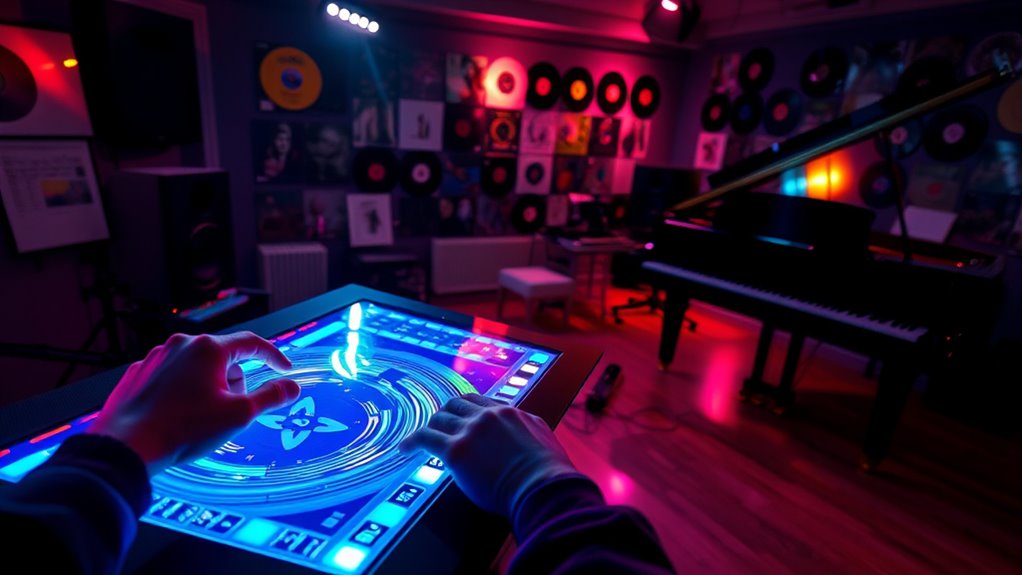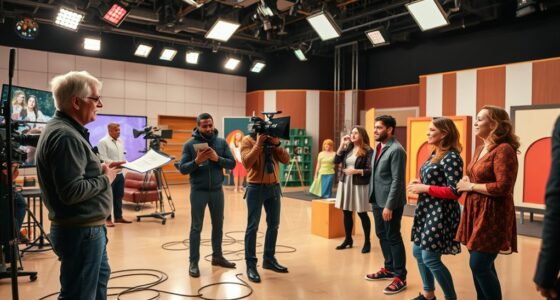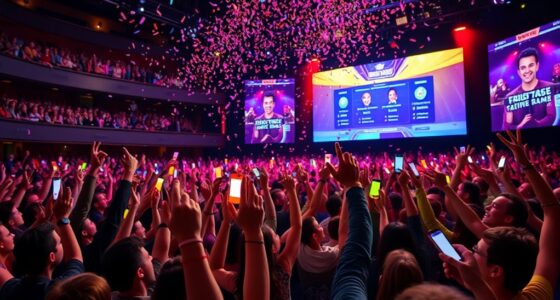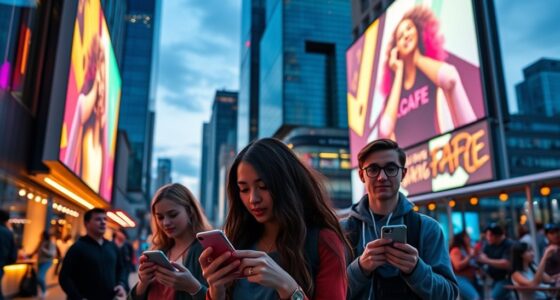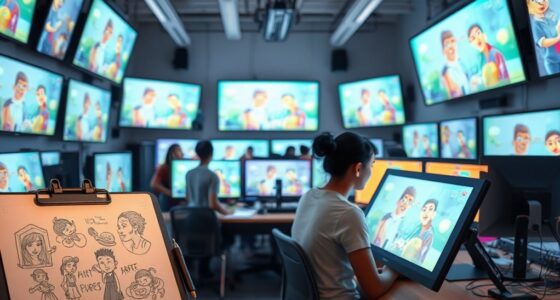AI in music composition is both creativity and a semblance of copycat behavior. It analyzes extensive musical datasets to produce original melodies that mimic human-like qualities. While it can inspire and challenge you to explore new genres, critics argue it lacks emotional depth, raising doubts about true originality. However, human composers also build on prior works. The balance between AI as a creative tool and traditional artistry is an evolving conversation worth exploring further.
Key Takeaways
- AI analyzes extensive musical datasets, generating original compositions that mimic human creativity while exploring new musical ideas and genres.
- As a creative collaborator, AI generates melodies and chord progressions, encouraging musicians to push their creative boundaries and experiment with innovative structures.
- Critics argue that AI lacks emotional depth and originality, as it learns from existing music and doesn’t experience emotions like human composers do.
- The rise of AI in music raises ethical questions regarding authorship, ownership, and the need for new licensing frameworks within the industry.
- Embracing AI as a creative tool can enhance human artistry, allowing for innovative outcomes while balancing machine intelligence and personal expression.
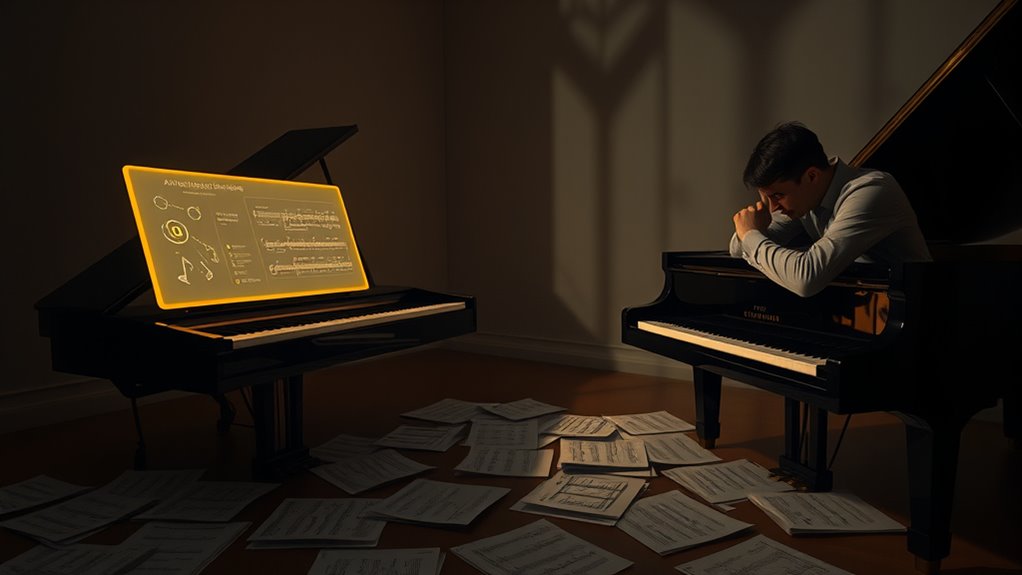
Have you ever wondered how artificial intelligence can transform the way we create music? AI’s role in music composition is nothing short of revolutionary. With advanced algorithms and machine learning, AI can analyze vast amounts of musical data, giving it the ability to generate original compositions that sound strikingly human. You might be amazed at how this technology can inspire musicians and reshape their creative processes.
AI is revolutionizing music composition, enabling groundbreaking creativity and inspiring musicians to explore new horizons in their craft.
When you think about it, AI can serve as a powerful collaborator. Imagine sitting down to compose a piece and having an AI system generate melodies or suggest chord progressions. This kind of partnership can spark new ideas and push your creativity to unexpected places. You might find that AI’s suggestions lead you to explore genres or structures you wouldn’t normally consider. As a result, your music could evolve in ways you never thought possible.
However, some critics argue that AI is merely a copycat. They claim that it lacks the emotional depth and personal touch that human musicians bring to their work. While it’s true that AI learns from existing music, it doesn’t mean it’s incapable of creating something unique. You could argue that even human composers draw inspiration from their predecessors. The difference lies in the interpretation and the emotional journey each musician takes when they create. AI might not feel emotions in the same way, but it can still produce compelling and innovative music.
You might also wonder about the implications of AI-generated music on the industry. As AI becomes more integrated into music composition, it raises questions about authorship and originality. If an AI creates a hit song, who owns the rights? These are complex issues that the music industry will need to navigate as AI continues to advance.
Ultimately, the intersection of AI and music composition offers exciting possibilities. You can embrace this technology as a tool that enhances your creativity rather than replacing it. By leveraging AI, you can explore new musical landscapes, collaborate with a digital partner, and break free from conventional constraints. In this rapidly evolving landscape, the real challenge lies in finding a balance between human artistry and machine intelligence. You have the power to harness AI’s potential while infusing your unique voice and vision into every composition. So, are you ready to explore this brave new world of music creation?
Frequently Asked Questions
Can AI Create Entirely Original Music Compositions?
Yes, AI can create entirely original music compositions. It analyzes vast amounts of data, learns patterns, and generates new melodies or harmonies that haven’t been heard before. You might find its creations enthralling and innovative, pushing the boundaries of traditional music. However, the true essence of originality often lies in human emotion and experience, so while AI can produce unique music, it may lack the deeper connections that come from human creativity.
How Do Musicians Feel About Ai-Generated Music?
Musicians have mixed feelings about AI-generated music. Some embrace it, seeing it as a tool that enhances creativity and offers new inspirations. They appreciate the innovative sounds it can produce. Others feel threatened, worried that AI might overshadow human artistry and emotion. You might find that opinions vary widely, with some artists experimenting with AI while others remain skeptical, longing for the unique touch only a human can provide in their compositions.
What Are the Ethical Implications of AI in Music?
You might feel excited by the potential of AI in music, yet uneasy about its implications. On one hand, it democratizes creativity, allowing more voices to be heard. On the other, it raises concerns about ownership and authenticity. You wonder if human emotions can be replicated by algorithms, or if they’ll overshadow genuine artists. Balancing innovation with respect for creators is vital, making this a complex ethical landscape that requires careful navigation.
How Can AI Assist Human Composers Effectively?
AI can assist you effectively by providing inspiration, generating musical ideas, and helping with arrangement. It analyzes trends and styles, suggesting fresh elements you might not consider. You can use AI tools to automate repetitive tasks, giving you more time to focus on creativity. Collaborating with AI can also enhance your skills, as it offers feedback and alternatives, allowing you to refine your compositions and push your artistic boundaries.
Are There Copyright Issues With Ai-Generated Music?
Imagine a world where melodies dance like fireflies under a moonlit sky. You might wonder about copyright issues with AI-generated music. Yes, there are challenges. When an AI composes a tune, it can mimic existing works, leading to potential copyright conflicts. If you’re using AI-generated pieces, it’s crucial to guarantee they don’t infringe on someone else’s creative spark. So, tread carefully and consider legal implications when exploring these musical avenues.
Conclusion
As you listen to AI-generated melodies, imagine a painter mixing colors on a canvas; the brushstrokes echo influences of past artists. Yet, is this artistry or mere imitation? Like a mirror reflecting your own emotions, AI captures the essence of human creativity, though it may lack the soul behind the strokes. Ultimately, it’s up to you to decide if this digital composer is a creative companion or simply a clever copycat in the symphony of life.
